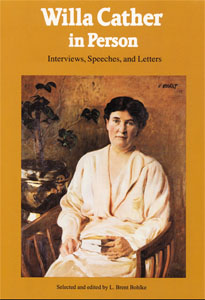from Willa Cather in Person: Interviews, Speeches, and Letters
Selected and edited by L. Brent Bohlke
Lincoln & London: University of Nebraska Press, 1986
1925: LONDON
Although Willa Cather's first published book was a collection of poetry, April Twilights, in 1903, that was not the genre for which she became famous. She had begun writing poetry for publication in 1892. Bernice Slote has outlined her career as a poet in considerable detail in her introduction to April Twilights (1903), Revised Edition (Lincoln: University of Nebraska Press, 1968). Cather selected and revised poems from the first collection to be included in her 1923 April Twilights and Other Poems and again in the 1937 version in her collected works. But as Slote points out, "April Twilights of 1903 marks the virtual end of Cather's writing of poetry." Her letter to Alice Hunt Bartlett makes it clear that poetry was of little interest to her creative energies by 1925.
Alice Hunt Bartlett (1869-1949) was the American editor of the Poetry Review of London for nearly thirty years, having become interested in poetry after the death of her husband, Dr. William Allen Bartlett, in 1921. In 1924 she received the gold medal of the Poetry Society of Great Britain. She was a vice president of the Poetry Society of London and was involved in numerous literary societies in England and the United States. The American poetry section of the Review was her creation, and the eleventh segment included Emily Dickinson and Robert Hillyer, besides Cather. Mrs. Bartlett's historical drama, Washington Pre-eminent, was chosen as the basis for the pageant held in the nation's capital celebrating the bicentennial of the birth of George Washington in 1932.
The introductory material is quite familiar, even though the chronology of certain portions of Cather's life is somewhat telescoped. The complete article also reprinted "In Rose Time," portions of "A Likeness," "A Silver Cup," "Going Home, "Macon Prairie," and the entirety of "Spanish Johnny" and "L'Envoi."
THE DYNAMICS OF AMERICAN POETRY—XI
Willa Sibert Cather gives us from her own knowledge of American life, and we may depend on her pictures, in which we find a Virginia background and a father who exhibited pioneer blood and crossed the Alleghennies and the Mississippi Valley to settle in the West, and on a ranch in Nebraska, when Miss Cather was but nine. From such neighbours as the little girl found in the sparsely settled country, Scandinavians, Russians and Bohemian farmers, she must have made her first world contacts.
The nearest school was at Red Cloud, and there she received her only schooling until she entered the State University and graduated at nineteen, going at once to Pittsburgh, where she was employed on the Pittsburgh Leader as telegraph editor and dramatic critic. On this paper she had her first experience in writing, and shortly after published her first book of verse, April Twilights (Badger, Boston, 1903), a slim book of poetry filled with her woods in winter, white birches, evening songs and laments, legends and taverns and hawthorne trees, the night express and rose time. . . .
Miss Cather writes me:
"I am afraid you will have a hard time proving that I have been an 'effective force in American poetry.' I do not take myself seriously as a poet. However, since you ask me which ones of my poems I prefer, I will tell you some of them. 'A Likeness,' 'A Silver Cup,' 'Going Home,' and 'Macon Prairie,' I think are the best ones. I believe 'Spanish Johnny' is most popular."
The Poetry Review 16 (1925).
